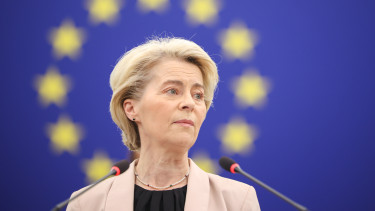Hungary has no Plan B, awaits new conditions from Brussels - Navracsics

The current situation in a nutshell
- Due to systemic irregularities (mainly corruption and fraud with EU funds) the European Commission has launched the conditionality mechanism of the rule of law procedure against Hungary, proposing the suspension of 65% of commitments for three operational programmes (environmental protection, transport, and regional development) under the cohesion policy. This would amount to an estimated EUR 7.5 billion (4.4% of forecast 2022 GDP).
- Another and even bigger near-term risk is that Hungary’s National Recovery Plan (NRP) is not approved in time for the full disbursement of EUR 7 billion (4.1% of GDP) in NextGenerationEU grants. Hungary plans to submit a new NRP by end-September, which is likely to add a request for NGEU loan funding.
- Hungary has committed to taking 17 remedial measures, but the EU executive remains sceptical and wants regular report (every three months) and actual implementation from Hungarian authorities (an update is due by 19 Nov).
The necessary financial resources have been promised by the European Union, and if they are not forthcoming, we will raise the necessary funds from other sources. We have started negotiations with the EU and other partners to this end,
Prime Minister Viktor Orbán said in Parliament on Monday.
No Plan B
When asked about this, Navracsics told Portfolio “it is natural that a prime minister of a country thinks in alternatives,” adding that “the chances are now better than ever that we will be able to get EU funds, because the negotiations have been successful.”
He has denied, however, that considering alternatives means Budapest has a Plan B.
There is no Plan B, the agreement with the European Commission is Plan A, and we will implement it.
He stressed that the parliamentary debate on the bills Hungary promised to table by 30 September began on Monday evening, four days before the deadline.
The fact that we are meeting our deadlines earlier is the strongest proof of how serious we are about our commitments and our agreement with the European Commission.
Welcome commitments
Asked about the reception of some of Hungary’s commitments, such as the Integrity Authority or the Anti-Corruption Task Force, Navracsics replied:
The last time I was in Brussels last Wednesday, I spoke to Budget Commissioner Johannes Hahn about this and other things, and it seemed to me that the Commission was satisfied with the Hungarian plan,
said Navracsics.
"It is possible, however, that there will be some fine-tuning in some details, as the legislative process also gives us the opportunity to clarify the rules with amendments, but I can say that there is a broad consensus between the Commission and the Hungarian Government on the Integrity Authority," he added.
Judiciary reform requested too
If Hungary wants to unblock EU funds, it not only has to see through, i.e. fully implement 17 measures it committed to the European Commission, but it must also commit to reforms in the judiciary, or the European Commission will not approve Hungary's recovery plan and make transfers only if the commitments are met, Justice Commissioner Didier Reynders told Bloomberg last week.
When asked what these reforms would be and if Budapest is willing to take remedial measures in this respect as well, Navracsics replied that they are still waiting for the Commission to clarify its expectations on the judicial reform.
Unfortunately, the biggest problem is precisely that the Commission has not yet said what its expectations are that would allay its concerns about the independence of the judiciary.
"We have also been informed, largely through the press, that the negotiations on the recovery fund will also raise questions about the independence of the judiciary.
"As we have not yet received these questions, we cannot say what the specific issues are that need to be addressed," he added.
He said the government has inquired at the Commission about its specific requests, “but we were told that the negotiating committee did not yet have a mandate.
“This is also strange, because if you look at the European Commission's Justice Scoreboard, there are no dramatic findings about the Hungarian justice system. There are problems, no one denies that, but there are no problems that should lead to the withdrawal of EU funds.”
Everything's gonna be alright...
Asked about the tight deadline (19 November), Navracsics stressed that it is the deadline of the conditionality procedure, and expressed hope that the Integrity Authority will be up and running by then, which the EC could perceive as a key sign of Hungary’s serious commitment.
We have said several times that we want to reach an agreement and we will consider all proposals, but we need to be aware of all the details that the European Commission has identified as problems.
Asked if he could assuage investors’ concerns, the minister pointed out that although it was less prominent, PM Orbán made a clear commitment to the European Union and to Hungary's place in the European Union at the beginning and end of his speech yesterday.
"And if we are members of the European Union, then we also have a claim to the rights that come with membership, including the resources that we are entitled to on the basis of our membership.
Therefore, I would also say to investors that we will reach an agreement with the European Commission.
Conflicts between Budapest and Brussels in his area of operation will be reduced, he promised, adding that the relationship between Hungary and the European Commission will be much more balanced and much more predictable.
Cover photo: MTI/Péter Lakatos. Tibor Navracsics, minister for regional development holds a press conference about European Commission decisions in his office on 18 September 2022.














